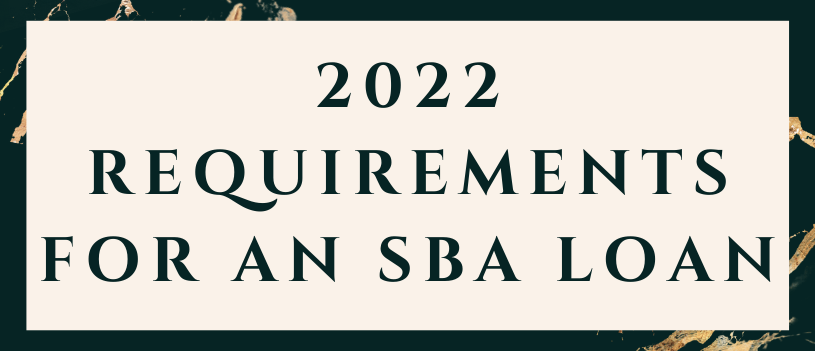If you are currently searching for ways to fund your business, then you may be aware of SBA loans. For those who are not familiar, an SBA loan is a government program through a commercial lender that helps finance startup costs, equipment purchases, and real estate for businesses. Unlike other small business options, SBA loans have extensive requirements.
If you are able to meet the long list of requirements, then this option for financing is known as the gold standard for small businesses since they generally have low down payments, reasonable interest rates, and longer repayment terms. The qualifications for SBA loans can be very simple, however, they could be more complex depending on the lender you work with and which SBA loan program you choose.
Before you apply for an SBA loan, it is important that you understand all of the requirements. By doing this, you will be able to speed up the application process and will also help increase your chances of securing an SBA loan. As you research which SBA lenders best fits your needs, understand the qualifications for different SBA loan programs and evaluate if you are eligible.
To qualify for an SBA loan, you must first be a for-profit US business in an eligible industry. Your business must be officially registered and you should be operating your business legally. Unfortunately, nonprofit businesses aren’t eligible for most SBA loans, however, not-for-profit childcare centers may be able to qualify for SBA microloans. The following industries are unable to apply for SBA loans:
- Life insurance companies
- Businesses primarily engaged in lending
- Businesses making most of their revenue from gambling activities
- Businesses primarily engaged in political or lobbying efforts
- Speculative businesses (i.e. medical research, shopping center developer)
- Most passive income businesses (i.e. flea market, shopping center)
If you would like a complete list of industries barred from receiving SBA loans, you can view the SBA’s eligibility questionnaire.
Another requirement for an SBA loan is that you are unable to access credit elsewhere. This means that a participating lender must document for the SBA that there are no other financing options available. This could be due to time in business, borrowing history, or other factors.
Your business must also meet SBA size standards. SBA measures businesses in three ways: by the number of employees a company has based on your industry, by business revenue based on your industry, and by a business’ net worth. To qualify as a “small” business, you can have anywhere between 100 to 1,500 employees depending on your industry. Your revenue also depends on what industry you are in and can be anything from $750,000 to under $38.5 million. Lastly, your business is considered small if your net worth doesn’t exceed $15 million or $5 million in net annual income.
Next, your business will have to meet a lender’s criteria for an SBA loan. It is important to note that the requirements do vary by lender, however, most lenders will look at the following four requirements.
- First, they will look at your personal character and your background. To qualify for an SBA loan, you’ll have to provide your previous addresses, criminal record, and your citizenship status.
- They will also look at how long you have been in business. For some of the SBA CAPLines, it is required that you are in business for a minimum of one year, while an SBA microloan requires that you have been in business for two years generally. It is important to know that the longer you have been in business, the more likely you are to get approved for a loan.
- Your personal credit report will be reviewed. If your credit score isn’t above 700, you will most likely have some difficulty qualifying as this tends to be the minimum level for an SBA loan.
- Lenders will also look at your business credit score. Specifically, the SBA uses the FICO Small Business Scoring Service (SBSS) to review your business. The SBSS score ranges from 0 to 300. Your loan may possibly be rejected if your score is below 140. Most lenders set their minimums even higher at 160.
Besides providing background information about you and your business, your SBA loan application will also request the following documentation:
- resumes of company management,
- your business plan,
- your personal and business tax returns,
- business financial statements,
- business debt schedule,
- bank statements,
- legal documents.
Lastly, the lender will require adequate collateral in order to secure an SBA loan which is anything you are willing to pledge in case you are unable to repay your loan. This could be equipment, real estate or inventory that your business uses. You will also most likely be required to sign a personal guarantee using SBA Form 148 or 148L if you own 20% or more of the business.
It can feel intimidating for business owners as they navigate the different requirements for SBA loans. Overall, all SBA lenders are trying to determine through the application how you plan on using the loan proceeds and if your finances are in order so that you can pay back the loan in a timely manner. If you need more assistance in how to secure an SBA loan, review Fundera’s step-by-step guide on how to get an SBA loan.
